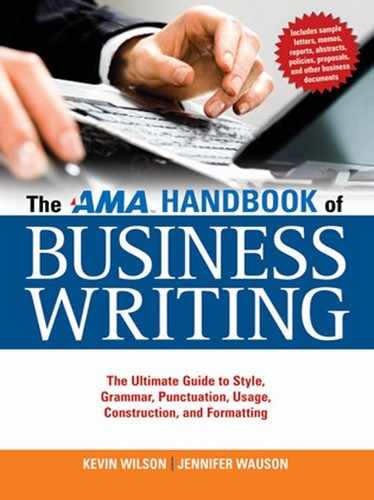G
GAGE, GAUGE
Gage is an alternative spelling for gauge.
A gage is a measuring instrument that is used to measure the amount or the position of something. Gages are found in cars, airplanes, and industrial plants, among other places.
Gage can be a verb that means to estimate quantities or time.
Example: What do you gage the depth of the river to be?
Gage can also be a noun that is used to measure things, such as the distance between railroad rails, the thickness of wire, and the size of a shotgun’s barrel.
GENDER
In many languages, such as Spanish, French, and Italian, there is a grammatical category for gender: masculine, feminine, or neuter.
The only times that gender is indicated in English is when certain nouns refer to a male or female animal or person.
Example: lion (male), lioness (female); waiter (male), waitress (female); actor (male), actress (female)
GENITIVE MARKER
When nouns take an ’s to indicate possession, this is called a genitive marker.
Don’t confuse the genitive marker with the ’s that is added to contracted verbs.
Example: Horace’s [Horace is] going to the store.
GERUND
A gerund is a verb form ending in -ing that acts as a noun.
Example: Walking [gerund] in the street after dark can be dangerous.
Gerunds are usually accompanied by other words that make up a gerund phrase.
Example: Walking in the street after dark [gerund phrase] can be dangerous.
Because gerunds and gerund phrases are nouns, they can be used just like nouns:
![]() As a subject
As a subject
Example: Being president is a difficult job.
![]() As an objective of a verb
As an objective of a verb
Example: He didn’t really like being poor.
![]() As an objective of a preposition
As an objective of a preposition
Example: He read a book about being careful.
GIGABYTE
A gigabyte equals 1,024 megabytes, or 1,073,741,824 bytes. The abbreviation for gigabyte is GB (not G or Gbyte).
The first time that you use gigabyte in a document, spell out the word and put the abbreviation in parentheses.
When used as a measurement of computing speed, leave a space between the number and the abbreviation.
Example: The computer has 2 GB of memory.
When the measurement is used as an adjective preceding a noun, use a hyphen.
Example: Are those 1-GB or 2-GB memory chips?
GIGAHERTZ
Gigahertz is a measurement of computer speed. One gigahertz is equal to one billion cycles per second. Gigahertz is abbreviated as GHz.
The first time you use gigahertz in a technical document, spell out the word and put the abbreviation in parentheses. Leave a space between the number and the GHz.
Example: The computer has 2 GHz of processing speed.
If the number and abbreviation are used as an adjective preceding a noun, use a hyphen.
Example: Is that a 2-GHz processor in your laptop?
GLOSSARY
A glossary is an alphabetical list of words or phrases and their definitions.
Example: RAM—Random access memory
A glossary is useful in reports and other long documents when readers may be unfamiliar with the terminology being used. A glossary usually appears at the end of the document.
A glossary is usually introduced by the same heading level used for other chapters or sections in the document.
The content of a glossary explains concepts that are unique to a particular business, industry, or technology.
GONE, WENT
The past participle of went is gone.
Example: I went to the store.
Example: I should have gone to the store.
GOOD, WELL
Good is an adjective and well is an adverb. When describing an action verb, the only choice is the adverb well.
Example: He speaks well.
When using a linking verb or a verb that has to do with the five human senses, use the adjective good.
Example: You smell good today.
Many writers use well after linking verbs related to health because well is related to wellness.
Example: How are you doing? I am well, thank you.
GOT, GOTTEN
Don’t use got, when you can use have, has, or must.
Incorrect: I got a new car.
Correct: I have a new car.
Correct: He has a new job.
Incorrect (colloquial): I’ve got to stop at his house.
Correct: I must stop at his house. … I have to stop at his house.
Gotten is an obsolete term. Do not use it; replace it with got.
GRAMMATICAL HIERARCHY
Grammatical hierarchy is a way of studying language by classifying it as sentences, clauses, phrases, and words. Consider the following example of a grammatical hierarchy:
![]() Sentences consist of one or more clauses. Sentences are at the top of the grammatical hierarchy because they are the largest unit.
Sentences consist of one or more clauses. Sentences are at the top of the grammatical hierarchy because they are the largest unit.
![]() Clauses consist of one or more phrases.
Clauses consist of one or more phrases.
![]() Phrases consist of one or more words. Words are at the lowest level of the grammatical hierarchy. (Morphology is the study of how words are constructed.)
Phrases consist of one or more words. Words are at the lowest level of the grammatical hierarchy. (Morphology is the study of how words are constructed.)
GRAY, GREY
Gray is the American spelling; grey is the spelling in the United Kingdom.
GUESS
Don’t use guess when you really mean think.
Incorrect: I guess you are right.
Correct: I think you are right.
Correct: In the word game, Marcus was the first to guess correctly.
